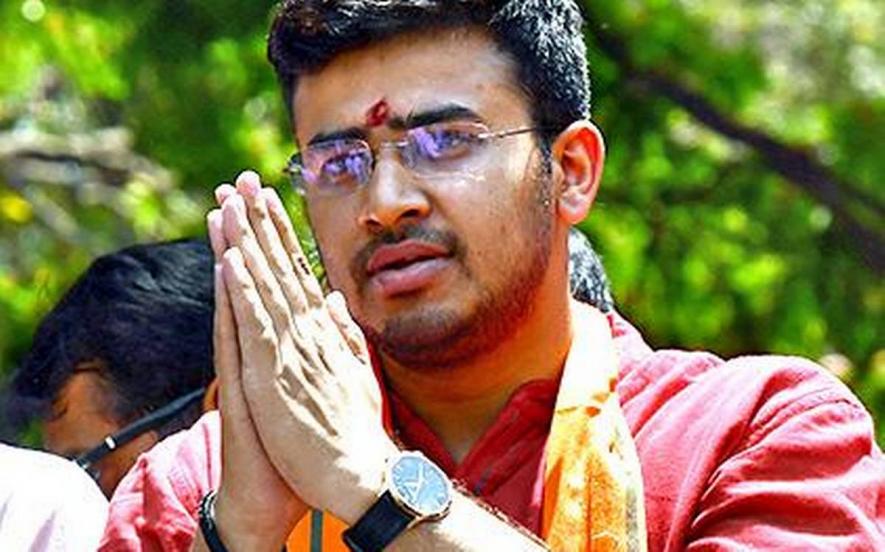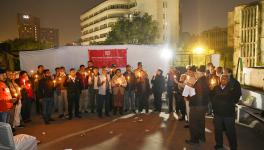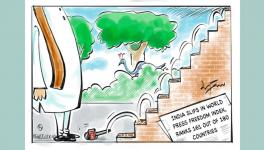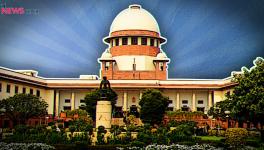Gag Order on Media on Tejasvi Surya’s Petition

Image Courtesy: The Hindu
In the election season, when it is high time for the media to hold political leaders’ feet to the fire, a Bangalore court has taken the unprecedented decision to impose a gag order against the publication of any “malicious, defamatory or derogatory” item in print and electronic media. The court granted the blanket injunction without following the principles laid down by the law and various Supreme Court decisions, and is so broad in scope that unless overturned at the earliest, could set a very dangerous precedent.
Judge Dinesh Hegde of the City Civil and Sessions Court, Bangalore, imposed the Interim Injunction on the plea of Tejasvi Surya, the Bharatiya Janata Party candidate for Bangalore South constituency in the upcoming Lok Sabha elections, and has issued the order to gag the media till the next date of hearing on May 27, which is well after the results would be declared.
Surya contended that 49 outlets, including English and Kannada print and electronic media as well as Google, Yahoo, Facebook and Twitter published a series of articles and social media posts about #MeToo allegations against him. The articles were prompted by an exchange on Twitter between columnist Shefali Vaidya and one Dr. Som Dutta, who alleged that Surya was a “womaniser, abuser and woman beater”. Dr. Dutta has since deleted the tweets and deactivated her Twitter handle.
The Court in its order held, “It appears that some of the prima-facie defamatory messages pertaining to him is in transit in the Media i.e. print and electronic. The plaintiff has produced a copy of the twitter publication i.e, called as ‘Me Too’ case against Tejaswi Surya…
…How all of a sudden these allegations against the plaintiff emerged immediately after he filed nomination for the General Elections is a questionable question.”
Also Read: The Art of Pressurising the Media
Relying on the Karnataka High Court’s decision in A.K. Subaiah v B.N. Garudachar wherein it was held that scurrilous remarks cannot be made in the guise of exposing corruption, it further held that though the publications have the freedom of speech, the “human dignity of life” of any citizen cannot be violated.
Violation of Essential Principles
The law relating to prior restraint of publications, as laid down by the Supreme Court in Sahara v SEBI and earlier in the Rajagopal case (popularly known as the Auto Shankar case) mandates that the media can be restrained only if it violates the law, causes prejudice and irreversible damage to the plaintiff. Viewed in this light – the Bangalore court’s use of the term “derogatory” is too broad, and can mean anything and everything. The court did not arrive at any finding if prima facie any damage has been caused to Surya because the gag order is in respect of news items which are yet to be published. One wonders how could the court adjudicate upon the term “derogatory or defamatory” even before the statements had been made.
Also Read: High Court Reimposes the Original Gag Order on The Wire
In Ramrameshwari Devi & Ors. vs Nirmala Devi & Ors (2011), the Supreme Court had laid down guidelines for the grant of ex parte orders. They include, inter alia:
- The Presiding Judge must exercise due care, caution, diligence and attention while framing the issues for the suit so as not to include issues already decided by other courts in violation of the principle of res judicata.
- The trial judge must carefully scrutinise, check and verify the pleadings and the documents filed by the parties.
- The court should order discovery and production of the documents at the earliest so as to focus on the main controversies of the case and arriving at the truth of the matter.
- Courts have to be very careful in imposing ex parte orders. If an injunction has been granted on the basis of false pleadings or forged documents (which is very often the case in India), courts must impose costs on the litigants.
- Courts should give short notice to the Defendants and hear both parties before passing ex parte interim orders since the experience has been that once granted, these orders cause havoc and getting them modified is next to impossible.
- In an exceptional case where the court has to grant an ex-parte injunction, it must record in the order that if the suit is dismissed the petitioner will have to pay full restitution, actual or realistic costs and mesne profits.
The question is how could Judge Hegde grant the injunction within a day’s notice, without hearing the media houses and properly adjudicating the matter?
Judicial Censorship
More important is what the effects of such interim injunctions against publications are. As Gautam Bhatia writes, “These “interim” orders, which have the luxury of being virtually unreasoned because they are granted before any kind of substantive hearing, effectively kill the speech in question, given how long legal proceedings take in India. They are effectively decisions on the merits without any kind of examination of merits, and they choke off the marketplace of ideas at the very source. In developing a philosophy of “gag first, ask questions later“, the High Courts seem to be blissfully oblivious of the fact that what is at stake is a foundational fundamental right (Article 19(1)(a)); this is not some civil suit where you direct “status quo” pending final resolution. The more that “gag first, ask questions later” becomes standard judicial practice, the more Article 19(1)(a) will be reduced to a dead letter – and the doing of the deed will not be by the executive, but by the judiciary.”
Bhatia says it is a clear instance of judicial censorship because the media is barred from publishing something allegedly defamatory and then invoking the defence of truth or fair comment.
Pamela Philipose, veteran journalist and the Readers’ Editor of The Wire told NewsClick that Judge Hegde’s Order deals a blow to media freedom, especially when during election time, it is the duty of media houses to scrutinise every politician and candidate’s actions and antecedents with a fine toothed comb. Moreover, Surya has made a host of abrasive statements in his election campaign, and shows no sign of stopping. All the more reason why he should be subjected to criticism. But that has become impossible with this sweeping gag order, which makes it incumbent upon the media to challenge it and have it set aside.
Read More: Strangulating the Media is Not the Right Way to Fight Fake News
Get the latest reports & analysis with people's perspective on Protests, movements & deep analytical videos, discussions of the current affairs in your Telegram app. Subscribe to NewsClick's Telegram channel & get Real-Time updates on stories, as they get published on our website.
























